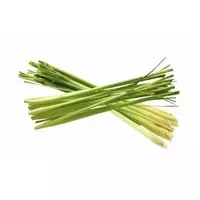Lemon grass

Have you ever heard names like lemongrass, lemon sorghum, citronella, Malabar or Kohinhink grass? Experienced culinary experts, of course, will answer positively, but ordinary lovers of home cooking will shake their heads negatively. Well, let's get acquainted - these names are worn by the beloved lemon grass, which, having a citrus aroma with pleasant notes of almonds, tastes like lemon zest. It has the ability to convey its aroma and taste to dishes that are often used.
No one can name the exact homeland of lemon grass: someone says that this is Malaysia, and someone - India. Actually, currently lemon grass is grown throughout the tropics and subtropics.
Cooking often uses both fresh lemon grass stems and dried ones, either in general form or as a powder. However, it should be borne in mind that the stem of this grass is very rigid, in connection with which, it must either be finely chopped or rubbed into a paste. But despite all the inconvenience associated with the process of its use, the beneficial properties of lemon grass are simply obvious due to the content of a large amount of essential oils. The calorie content of lemon grass is 99 kcal per hundred grams of product.
Lemon grass has achieved its greatest popularity in Asian cuisine, where it is added to curries, stews, soups, seafood dishes, pork, chicken and beef. It is used as an additive in the preparation of various drinks, giving them a pleasant delicate aroma of citrus fruits.
Do you know that various magical properties are attributed to this plant? It is called "Voodoo grass" and planted around the house in order to get rid of snakes. Lemongrass is also used in the preparation of some types of potion, as it is believed to cause passion and sexual attraction.
Benefits of lemon herb
The benefits of lemon herb have a long history in the traditional medicine of the East, especially in the treatment of infectious diseases and fever. Having a tonic and stimulating effect, it has strong bactericidal and antiseptic properties.
In UK medicine, lemongrass is used to improve digestion, as well as stomach pain and the formation of gases in the intestines. Another benefit of lemon grass is the ability to improve memory, help concentrate attention, increase collection and eliminate the consequences of overwork.
Harm of lemon grass
Scientists have found that lemon herb oil is soothing for headaches, but it must be dissolved in base oil and only then carefully massaged with forehead and whiskey. Otherwise, the harm of lemon grass can be detrimental to your health, namely the skin, as irritation, redness and itching will follow.
99 kCal lemon grass
The energy value of lemon grass (Ratio of proteins, fats, carbohydrates - ju):
Proteins: 1.82 g (~ 7 kCal)
Fats: 0.49 g. (~ 4 kCal)
Carbohydrates: 25.31 g (~ 101 kCal)
Energy ratio (bj | y): 7% | 4% | 102%
 Español
Español Français
Français Português
Português Русский
Русский 简体中文
简体中文 繁體中文
繁體中文 日本語
日本語 한국어
한국어 العربية
العربية Türkçe
Türkçe Қазақ
Қазақ Deutsch
Deutsch Italiano
Italiano Українська
Українська
